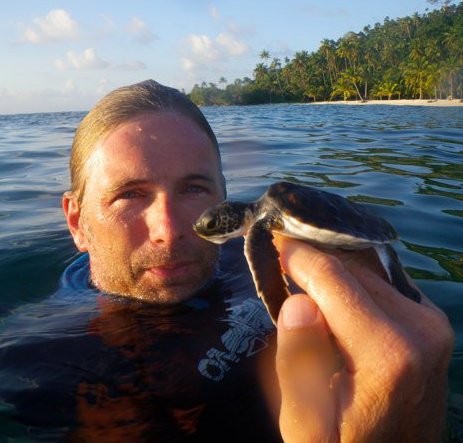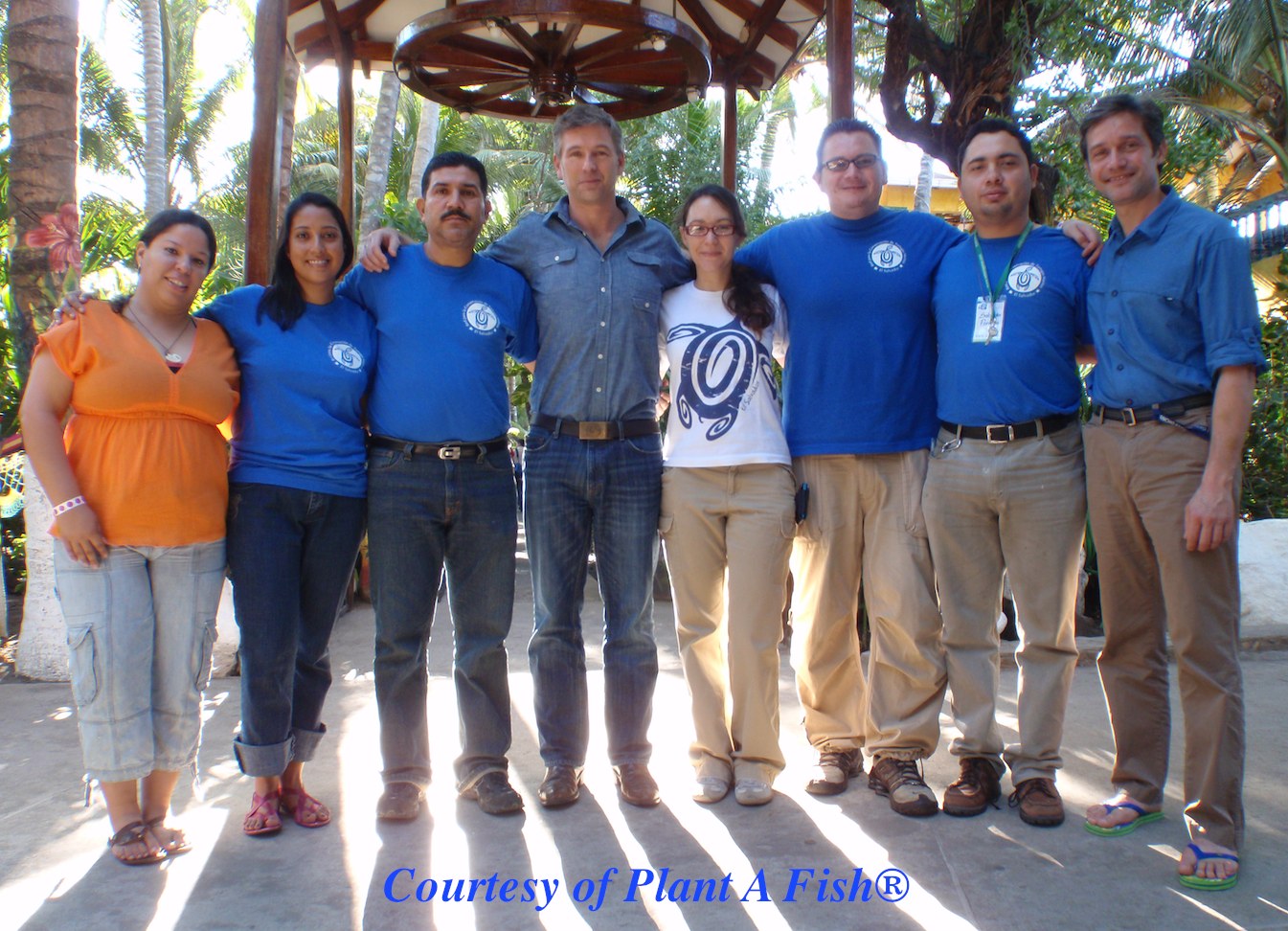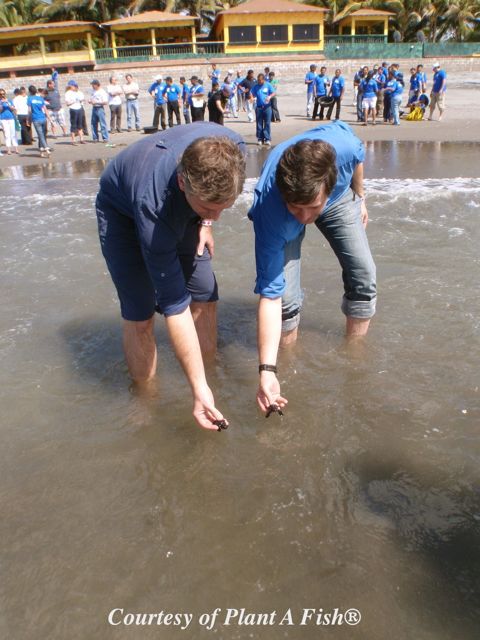
In today's world of rapid climate change, mass pollution and ever-increasing diminishment of species, thankfully there are still remarkable individuals out there on the front lines who somehow manage to see the light at the end of the dismal tunnel of despair and destruction. Through their extraordinary work and personal example, they are able to offer tangible evidence of genuine hope for the future. Marine biologist, researcher, lecturer, ocean ambassador and founder of several initiatives far too numerous to list in one breath, Dr. Wallace J. Nichols moves to the beat of his own drum in the conservation movement taking calculated leaps of faith and turning the all too often 'doom and gloom' scenarios of the nightly news into win/win scenarios for both the human family and animal kingdom alike.
I first met "J" back in 2008 upon return from his latest field expedition to Central America where he works tirelessly at bringing together communities and environmental initiatives through his non profit organization, Ocean Revolution. I was immediately struck by his seemingly effortless, if not infectious, positive demeanor and no nonsene approach at creating sustainable solutions for some of the most critical issues facing our planetary home today, not too mention his enthusiastic passion for 'all things' sea turtle. In a recent interview, he explained:
The projects I'm attracted to seem to be those considered "impossible" or "too late". A few decades ago I started studying sea turtles in Baja against the advice of my academic advisors and funders who thought that it was too late or too hard to help Baja's endangered sea turtles due to the tradition of hunting and eating them, severe bycatch levels, narco-influence and institutionalized corruption. Today I'm sitting in La Paz at the 13th Annual Meeting of the GrupoTortuguero.org, a thriving and successful grassroots movement that has spread all over northwest Mexico. Sea turtles all around Baja are making a comeback.

Photo courtesy: J Nichols
A self proclaimed "turtle geek" who admits that he has been into sea turtles ever since catching them as a kid and professionally over the course of the past twenty years, he added:
As a marine biologist, I find endless fascination in sea turtles. They swim back and forth across entire oceans, are incredibly resilient, occupy both land and sea, yet are harmed by so many of our activities--from our plastic pollution and coastal development to our shrimp dinners. I think they are a compelling and charismatic ambassador for both what is beautiful and mysterious on Earth and what needs to be fixed.
J recently returned from yet another successful mission to Central America, this time to El Salvador, where he and Fabien Cousteau, grandson of the late legendary Jacque Yves Cousteau, founder of Plant A Fish and lifelong ocean advocate, have supported a progressive community based project in conjunction with the locally run organization, FUNZEL. According to Cousteau, "By empowering locals to get connected to their aquatic backyard, communities that may have previously had no other ways to make a living are provided a positive alternative that creates livelihoods while protecting and restoring the environment at the same time. It's a win win situation." Added J:
Three years ago nearly all of the turtle eggs in El Salvador were collected and sold in the cities. This year, the national network of tortugueros made up of former egg collectors, supported by conservation scientists, released 1.6 million baby sea turtles into the ocean. They've set their 2011 goal at two million. Lately, we've also been working with people and turtles in Indonesia, with similar results. In all three countries, we work with some of the poorest people on the planet. And they are having unexpected successes. When I'm in need of some hope, my colleagues in Baja, Indonesia and El Salvador provide it by the boatload.

Fabien Cousteau and his ocean restoration organization, Plant A Fish, have been great friends of the sea turtles," added J. "Together we hope to support the release of one billion baby turtles over the coming decades." According to Cousteau, "We are joining forces because I strongly believe that there is a multiplication factor when aligning with like minded organizations. No one can do this work alone. As my Grandfather used to say "we are all in the same boat," and therefore it benefits us all to row in the same direction! We simply don't have time to waste at this point." He further added:
"The sea turtle is the 'canary in the coal mine', as are all the apex animals of the food web. As the gardeners of the ocean, they are a symbol of health for coral reefs, mangroves and seagrass beds, and act as a barometer for the overall health of the oceans. Because they reproduce so slowly and take so long to mature, their recovery will also take a long time. However, in places where restoration efforts have commenced, we've seen positve numbers of restoration, so it can be done. El Salvadorians are taking on the restoration initiative as their own rather than just having outside sources come in. It's a very exciting next step to be able to see that progress unfold."

Last week J launched SEEtheWILD, an innovative initiative which allows everyday citizens to learn about endangered species and directly interact with them through conservation travel based projects. This conservation model fosters sustainable solutions by providing viable alternatives to local communities who can benefit from the protection and celebration of endangered wildlife rather than the out dated practices of hunting and poaching for a fraction of the profit. According to J:
"We've been thinking a lot about ways to support community-based conservation efforts at places with urgent needs. While not a silver bullet, conservation travel offers some opportunities. We started a pilot project called SEEturtles.org that connected people with community-based tourism projects and sea turtles. The results have been great across the board, turtles and the people who live near them have benefited, and travelers have had some of the most profound experiences of their lives. So, we've expanded the project, now called SEEtheWILD.org, to include other groups of animals like whales and sharks, bears and big cats. When people interact and help endangered wild animals, under the guidance of local experts, great things can happen."
Added Cousteau, who has a seemingly inherent understanding of the ecological laws of biodiversity:
"As much as people want to have a beautiful planet- it's about saving our own skins and we do that through saving the species we love and depend on. It's a package deal. It's like playing pick up sticks. You can only pick out so many before the entire web of life crumbles. Nature has a fantatsic propensity to heal itself if we just give it a break. Giving it a break is a communal effort. I look forward to the day when we do not need a restoration initiative because we have learned to live with the planet rather than on the planet."
To learn more about Dr. Wallace J. Nichols and how you may support his work as an independent scientist, please visit 100BlueAngels.org
For more information regarding his many important projects, please visit the following:
Ocean Revolution
Oceanophilia
Blue Marbles
SEEtheWILD
Slowcoast
Pluckfastic
Please note that this is a two part series surrounding the work of Dr. J Wallace Nichols. Up Next: Blue Marbles!